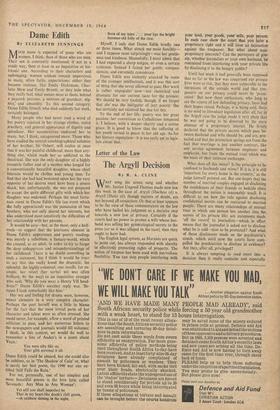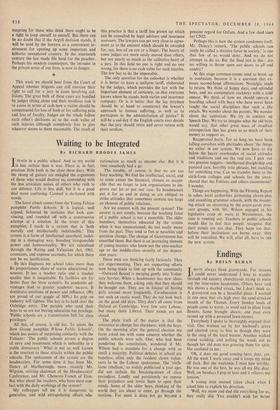Letter of the Law
The Argyll Decision
By R. A. CLINE WHAT song the sirens sang and whether Mr. Justice Ungoed-Thomas made new law this week in the case of Argyll (Duchess of) v. Argyll (Duke of). though matters of doubt, are not beyond all conjecture. Or that at least appears to be the view of those commentators on the law who have hailed his judgment as a decisive step towards a new law of privacy. Certainly if the courts had no power to protect a wife whose hus- band was selling her gynecological secrets to the press (or so it was alleged in the case), then they ought to have had.
The English legal system, as Marxists are quick to point out, has always responded with alacrity in effectively protecting rights of property. The action of trespass has been used with marvellous flexibility. You can stop people interfering with your land, your goods, your' wife, your person. In' each case show the court that you have a proprietary right and it will issue an injunction against the trespasser. But what about non:. proprietary interests? Can the purveyors of goS- sip, whether journalists or your own husband, be restrained from interfering with your private life by disclosing it to the hungry public?
Until last week it had generally been supposed that so far as the law was concerned our private lives were at risk, that they were vulnerable to the intrusions of the outside world and that tres- passers on our privacy could never be 'prose- cuted.' But now these enthusiasts, who long to see the courts of law defending privacy, have had their hopes raised. Perhaps, it is being said,, there is no need to introduce legislation after all, for in the Argyll case 'the judge, made it very plain that he was not going to be deterred by the mete•absence of a proprietary interest. He firmly declared that the private secrets which pass be- tween husband and wife should be, and are, pro- tected and that the protection springs not from the fact that marriage is just another contract, like any service agreement between employer and employee, but from the mutual trust which was the basis of their intimate' exchanges.
What does all this mean/ Is the principle tO'be confined to husbands and wives? If it is, it'is still 'important for every home in the country,' as the judge himself pointed out. But one hopes that the number of married couples engaged in disclosing the confidences of their fireside or bedside chats throughout the nation is reasonably small. It is difficult to see how the rule against disclosing confidential secrets can be restricted to married people. There are many relationships of mutual trust in which one person lets another into the secrets of his private life; are statements made 'off the record' to journalists—which in effect means that the journalist is asked not to disclose what he is told—now to be protected? And what. of those disclosures made on the psychiatrist's couch, which until now the courts have com- pelled the psychiatrists to disclose in evidence? Are they, after all, privileged?
It is always tempting to read more into a decision than it really contains and especially tempting for those who think there ought to be a right to keep oneself to oneself. But there can be no doubt that if the Argyll decision stands, it will be used by the lawyers as a convenient in- strument for opening up some important and hitherto unexplored country. In the nineteenth century the law made life hard for the poacher. Perhaps his modern counterpart, the intruder in the private areas of our lives, is now in danger.
This week we should hear from the Court of Appeal whether litigants can still exercise their right to call for a jury in cases involving col- lisions. The great bulk of these cases are handled by judges sitting alone and their invidious task is to assess in terms of cash how a victim should be compensated for loss of limb or for suffering pain and loss of faculty. Judges on the whole follow each other's decisions is to the cash value of such injuries although completely free to give whatever seems to them reasonable. The result of this practice is that a tariff has grown up which can be consulted by legal advisers and insurance assessors. The lawyers can get very close to agree- ment as to the amount which should be awarded for, say, loss of an eye or a finger. The hearts of some judges are more easily moved than others, but not nearly so much as the collective heart of a- jury. In this field no one is right and no one wrong, for there is no cash value for such injuries. The law has to do the impossible.
The only question for the onlooker is whether it is better to have a uniform tariff, elaborated by the judges, which provides the law with the important element of certainty, so that everyone knows where he stands, both victim and insurance company. Or is it better that the lay juryman should be at hand to counteract the lawyer's approach to human suffering, as well as to participate in the administration, of justice? It will-be a sad day if the English courts ever decide that the jury should retire and never return with their verdicts.





























 Previous page
Previous page